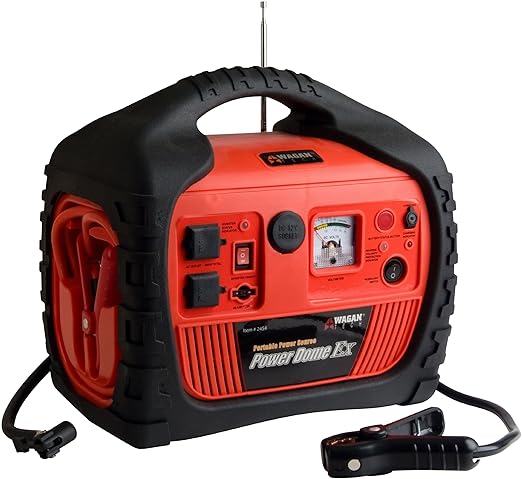happyliza said:
Meta-Agnostic:
This generator you're talking about sounds great. It does make a difference if it's AC or DC and how many volts but in any case with the proper converter it should be able to charge a car battery (or deep cycle 12v lead acid battery preferred. Deep cycle batteries can be discharged 50% or more of their capacity and recharged with minimal damage whereas a typical car battery can only withstand minimal discharge or larger discharge for a very short time before it's toast)
Thanks for the above information. I appreciate the fact that you are au fait with ways to create electricity in an off grid scenario.
My question is how can I keep my laptop and/or desktop running in such an event. I have more than 70k files I have copied for such an event (and to keep such info available) in order to help people after the emergency.
I too was thinking of a car battery but I don' know what components I need. Plus to have extra ones as replacements and how to recharge them on solar.
The other important item would also be to keep the freezer running as long as possible - if possible - in order to keep food preserved rather than cooking it all at once, as we would still have the problem of conserving it without it going off within days in the heat here.
I know we have to can things but I dont have that option at the moment due to finance etc.
The other important thing is to safeguard all my computers from EMF for which I intend to make Faraday cages (even from hamster cages if necessary) and to transfer information on to diverse media in case any media gets corrupted in the process due to EMF
I would value your input on the above as having saved all relevant information I know that it will be needed not only for my own recaps but also to help others in health and much much more, that is the reason I know I must keep my computer running to access the info once we no longer have internet.
I would bury stuff in the garden for including a spare laptop excepting the fact that even in a faraday cage I have no idea how to prevent it getting wet from deluges without losing the effect of the faraday cage. Wrap in polythene and then put in a metal grid?
I was discussing this with a friend today as well as asking if he can install camaras for me on my apartment (from when I had them for a club, though we cut the cables to take them out quickly as problems with the landlord). I have a downstairs neighbour that has just moved in and keeps messing with the mercedes emblem on my old banger so it alone has prompted me to get the 4 camaras installed.
I think this will be a wise move anyway bearing in mind the things we may witness when tshtf.
Hi happyliza,
Sure, I am happy to contribute my expertise. I do have some electrical and mechanical experience but I'm not a qualified electrician or engineer so any advice should be taken only as suggestion and followed up on independently.
In understanding electricity usage it helps to be familiar with a few terms like watts (power), amps (amperes/current/induction), volts (electromotive force) and resistance. It's not necessary to understand all of the physics in order to get things to work but here are a couple wikipedia articles you could start out with:
http://en.wikipedia.org/wiki/Electric_power
http://en.wikipedia.org/wiki/Ohm%27s_law
For the basics of calculating how many watts you need, the equation P=IE or watts = amps * volts comes in quite handy. It works for both AC and DC circuits and is important to keep in mind when converting between the two. Most electronic devices or major appliances should have an amp rating on them somewhere. If it's a DC (direct current) device then it should also tell you how many volts it uses. Sometimes they'll save you the trouble and also tell you how many watts, but if not, just multiply amps times volts. For example, a laptop power adapter might say it has an output of 20 volts and 3 amps, so 20 x 3 = 60 watts. For AC (alternating current) devices that plug directly into the wall without an adapter, they will usually only list amps as the standard voltage is implied (110 or 120 in the U.S.)
To power a laptop from a car battery, a simple low-wattage inverter and some wires to connect is all you should need. An inverter converts DC into AC i.e. household current. Inverters that plug into car cigarette lighters can be found pretty much anywhere; truck stops, auto parts stores, discount stores, hardware stores. I've often seen them on display near checkouts. Inverters are rated by how many watts they are able to provide, so for the 60 watt laptop you would be fine with one that could handle up to 100 watts or so which is about the lowest you'll usually see. I have a 70 watt one that's just a small box with a receptacle on the end of a cigarette lighter plug like this:

In theory that would be enough but you don't want to cut it too close; sometimes devices need more start up amps when they're first turned on. At the same time, inverters along with generators will have a higher "peak" watt rating along with a lower continuous rating. On the other end of the spectrum, getting an inverter that's too powerful (say, 1500 watts) for just a laptop is going to waste more of your car battery (or deep cycle battery if you can get one) when it's on.
Although it's important to know all the inverter stuff, with a laptop that runs on DC you would be better off getting an adapter for it that plugs directly into a car cigarette lighter, thus it stays with DC the whole time and doesn't use as much power going through an inverter. If one is available for your laptop model. One more thing about inverters. There are a few varieties like square wave, modified sine wave and true sine wave. Most cheap ones are going to be square wave or modified sine wave. These may cause problems operating certain sensitive electronic devices. However, with the laptop, if your laptop adapter is converting the current back to DC that should cancel it out and not create a problem. At least that's what I've found.
Running a laptop occasionally from a solar-charged car battery is one thing. Running a refrigerator is a much bigger undertaking. My fridge says it's rated 6.5 amps, so at 120 volts that would be 780 watts. But I might need that 1500 watt inverter after all because refrigerators generally use a higher number of amps than their continuous amp rating when they first start up, and this might not be thoroughly labeled. There was discussion earlier in the thread about more efficient refrigerators.
12 volt lead acid batteries are often but not always rated in amp-hours, but this rating is not necessarily precise. For instance, an 11 amp-hour 12v battery should power a device using 1 amp at 12 volts for 11 hours. If you powered a device that used 11 amps then it would only last for one hour. But in practice, the more amps used, the quicker the battery tends to drain even taking into account amp-hours. You're likely to get more total amp-hours out of a battery with low-powered devices. The amp-hours are with a constant 12 volts implied; if you're running an AC device with an inverter you'd need to convert to watts and back, or find watt-hours by multiplying amp-hours by 12.
Solar panels are going to be rated in watts, and generally speaking, the more watts the quicker the battery will charge. Also the voltage needs to match, either 12 volts for a single battery or batteries wired in parallel or multiples of 12 for batteries wired in series. If you put together a high enough wattage system you're also going to need a charge controller to keep from overcharging your batteries if you leave them connected all the time. I've looked into this but I'm not at that point yet. For me, a 5-watt panel rotated between a few different batteries occasionally means I'll have some emergency power when things go south and I'll be able to replenish it eventually (assuming no thick comet dust or EMP) but it's not going to do much good for keeping my meat cold with my current setup.
So bottom line, yes, it's not too hard to put together what you'd need to be able to maintain a laptop for a while without grid power. Probably you're better off printing out as much as you can beforehand, as you'd also have to take into account all the power requirements of the printer to do it afterward. The refrigerator however is going to be a much bigger undertaking. In many households it's the single most power-consuming appliance. You might be able to run a high-wattage inverter off of a running car and get fuel for it but to have a completely self-sufficient setup you'd need to make a pretty big commitment time and money wise to do it yourself or just hire professionals to do it.
Also, I agree with what Corvinus wrote above. If you're in an urban environment you're likely to have more pressing concerns in order to keep yourself, your loved ones and your belongings safe. But if you think the info on your laptop could make the difference in such a scenario, car jump starters like this:
are like a fancy portable case for a lead acid battery and often come with built-in inverters. You could trickle-charge one with a small solar panel. Maybe worth putting on the list for a bug out bag.


